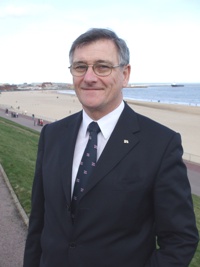|
Viewpoint from Revd Albert Cadmore for 16th Sept 2011
Revd Albert Cadmore
Chaplain to Norwich City FC, Parish Priest at Horsey & West Somerton, & a trustee of SCORE (the National Sports Chaplaincy Charity)
‘Football! Love it or hate it!’
I have written in this column previously about the Christian origins of several top football clubs and have reflected on the role of Victorian Clergymen who set out  to provide activities for people in their communities. At least a dozen of the clubs that have played in the FA Premier League owe their existence to a church, and we should also remember that Thomas Hughes’ Tom Brown’s Schooldays (1857), was inspired by, and inspired, the Christian sporting ethos of the public schools, which in turn inspired and influenced the development of ‘muscular Christianity’, as many clergymen in the 1870s, who were products of the public school system, passed on the values they had learned on their school sports fields to the young people in their parishes. There was a rapid spread of church cricket and football clubs throughout the country and members of the choir of Holy Trinity Church, Bordesley started a cricket club that eventually became Birmingham City FC, the headmaster of Christ Church Boys’ School, Bolton started a Sunday School football club that one day would become Bolton Wanderers and a Football Club was founded at St Mary’s Church, Southampton, which became the Southampton team still known as ‘The Saints.
The Victorian clergymen who were so instrumental in nurturing clubs into existence and growth can never have imagined how things would develop over the next 130 years or so. Their fostering of healthy exercise for the working classes, which developed into not only exercise but also entertainment, nurtured a sport that is sa  dly now priced beyond the means of many working class people as spectators, as wages have spiralled and ticket prices have escalated.
Peter Lupson, a Liverpool teacher and author, but also a lifelong Norwich City fan, has documented those early days of Football history, in his well researched and very readable book, ‘Thank God for Football! The Illustrated Companion’. It is both inspiring and humbling to read the stories of those pioneering Christians, living out their faith in their communities, and their stories provide food for thought as we reflect on the big business of modern day football.
The Christian presence is still there in the football and sporting world as Sports Chaplaincy has become more widespread, and there are now around forty chaplains associated with Premiership and Championship teams, and a further thirty five in Football Leagues One and Two.
The role of sports chaplains is to provide pastoral care and encouragement to players and others, and in my role as a football chaplain, it pleases me to look back to our Victorian predecessors, and identify a link with their ‘muscular Christianity’. Perhaps all of us who are involved in the lives of our churches should learn lessons from those times about taking our faith out into the world and maybe a dose of modern ‘muscular Christianity’ could be a force for good in our world today.
|
| |
|
Neville Philpott (Guest) |
26/10/2011 20:25 |
A very interesting article about the link between Holy Trinity church and
Birmingham City FC. Your comment about the cricket club being started by
members of the choir rather than the congregation at large is an interesting thought. Do you have any written evidence to suggest it was the church choir as opposed to the congregation. I believe my Grandfather played cricket for the church around the time in question.
|
| |
|
Albert Cadmore (Guest) |
09/11/2011 14:54 |
It's good to see your response, Neville. In my article, I depended on research from my good friend Peter Lupson, from his book, 'Thank God for Football! The Illustrated Companion'. I quote, 'In 1871 members of the choir formed a cricket club at the church with the approval of the vicar at the time, Dr Oldknow. Oldknow gave permission for the club to use the church's name in its title and to play as Holy Trinity Cricket Club'. No doubt non-choristers joined the team as it became established - including your grandfather. (Why not put Peter's book on your Christmas wish list - it's a great read)
|
|
|
|
|